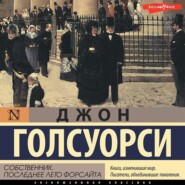По всем вопросам обращайтесь на: info@litportal.ru
(©) 2003-2024.
✖
The Island Pharisees
Настройки чтения
Размер шрифта
Высота строк
Поля
He went in, and, throwing his window open, remained there a long time, his figure outlined against the lighted room for the benefit of the dark square below, his hands in his pockets, his head down, a reflective frown about his eyes. A half-intoxicated old ruffian, a policeman, and a man in a straw hat had stopped below, and were holding a palaver.
“Yus,” the old ruffian said, “I’m a rackety old blank; but what I say is, if we wus all alike, this would n’t be a world!”
They went their way, and before the listener’s eyes there rose Antonia’s face, with its unruffled brow; Halidome’s, all health and dignity; the forehead of the goggle-eyed man, with its line of hair parted in the centre, and brushed across. A light seemed to illumine the plane of their existence, as the electric lamp with the green shade had illumined the pages of the Matthew Arnold; serene before Shelton’s vision lay that Elysium, untouched by passion or extremes of any kind, autocratic; complacent, possessive, and well-kept as any Midland landscape. Healthy, wealthy, wise! No room but for perfection, self-preservation, the survival of the fittest! “The part of the good citizen,” he thought: “no, if we were all alike, this would n’t be a world!”
CHAPTER VI
MARRIAGE SETTLEMENT
“My dear Richard” (wrote Shelton’s uncle the next day), “I shall be glad to see you at three o’clock to-morrow afternoon upon the question of your marriage settlement…” At that hour accordingly Shelton made his way to Lincoln’s Inn Fields, where in fat black letters the names “Paramor and Herring (Commissioners for Oaths)” were written on the wall of a stone entrance. He ascended the solid steps with nervousness, and by a small red-haired boy was introduced to a back room on the first floor. Here, seated at a table in the very centre, as if he thereby better controlled his universe, a pug-featured gentleman, without a beard, was writing. He paused. “Ow, Mr. Richard!” he said; “glad to see you, sir. Take a chair. Your uncle will be disengaged in ‘arf a minute”; and in the tone of his allusion to his employer was the satirical approval that comes with long and faithful service. “He will do everything himself,” he went on, screwing up his sly, greenish, honest eyes, “and he ‘s not a young man.”
Shelton never saw his uncle’s clerk without marvelling at the prosperity deepening upon his face. In place of the look of harassment which on most faces begins to grow after the age of fifty, his old friend’s countenance, as though in sympathy with the nation, had expanded – a little greasily, a little genially, a little coarsely – every time he met it. A contemptuous tolerance for people who were not getting on was spreading beneath its surface; it left each time a deeper feeling that its owner could never be in the wrong.
“I hope you’re well, sir,” he resumed: “most important for you to have your health now you’re going-to” – and, feeling for the delicate way to put it, he involuntarily winked – “to become a family man. We saw it in the paper. My wife said to me the other morning at breakfast: ‘Bob, here’s a Mr. Richard Paramor Shelton goin’ to be married. Is that any relative of your Mr. Shelton?’ ‘My dear,’ I said to her, ‘it’s the very man!’.rdquo;
It disquieted Shelton to perceive that his old friend did not pass the whole of his life at that table writing in the centre of the room, but that somewhere (vistas of little grey houses rose before his eyes) he actually lived another life where someone called him “Bob.” Bob! And this, too, was a revelation. Bob! Why, of course, it was the only name for him! A bell rang.
“That’s your uncle”; and again the head clerk’s voice sounded ironical. “Good-bye, sir.”
He seemed to clip off intercourse as one clips off electric light. Shelton left him writing, and preceded the red-haired boy to an enormous room in the front where his uncle waited.
Edmund Paramor was a medium-sized and upright man of seventy, whose brown face was perfectly clean-shaven. His grey, silky hair was brushed in a cock’s comb from his fine forehead, bald on the left side. He stood before the hearth facing the room, and his figure had the springy abruptness of men who cannot fatten. There was a certain youthfulness, too, in his eyes, yet they had a look as though he had been through fire; and his mouth curled at the corners in surprising smiles. The room was like the man – morally large, void of red-tape and almost void of furniture; no tin boxes were ranged against the walls, no papers littered up the table; a single bookcase contained a complete edition of the law reports, and resting on the Law Directory was a single red rose in a glass of water. It looked the room of one with a sober magnanimity, who went to the heart of things, despised haggling, and before whose smiles the more immediate kinds of humbug faded.
“Well, Dick,” said he, “how’s your mother?”
Shelton replied that his mother was all right.
“Tell her that I’m going to sell her Easterns after all, and put into this Brass thing. You can say it’s safe, from me.”
Shelton made a face.
“Mother,” said he, “always believes things are safe.”
His uncle looked through him with his keen, half-suffering glance, and up went the corners of his mouth.
“She’s splendid,” he said.
“Yes,” said Shelton, “splendid.”
The transaction, however, did not interest him; his uncle’s judgment in such matters had a breezy soundness he would never dream of questioning.
“Well, about your settlement”; and, touching a bell three times, Mr. Paramor walked up and down the room. “Bring me the draft of Mr. Richard’s marriage settlement.”
The stalwart commissionaire reappearing with a document – “Now then, Dick,” said Mr. Paramor. “She ‘s not bringing anything into settlement, I understand; how ‘s that?”
“I did n’t want it,” replied Shelton, unaccountably ashamed.
Mr. Paramor’s lips quivered; he drew the draft closer, took up a blue pencil, and, squeezing Shelton’s arm, began to read. The latter, following his uncle’s rapid exposition of the clauses, was relieved when he paused suddenly.
“If you die and she marries again,” said Mr. Paramor, “she forfeits her life interest – see?”
“Oh!” said Shelton; “wait a minute, Uncle Ted.”
Mr. Paramor waited, biting his pencil; a smile flickered on his mouth, and was decorously subdued. It was Shelton’s turn to walk about.
“If she marries again,” he repeated to himself.
Mr. Paramor was a keen fisherman; he watched his nephew as he might have watched a fish he had just landed.
“It’s very usual,” he remarked.
Shelton took another turn.
“She forfeits,” thought he; “exactly.”
When he was dead, he would have no other way of seeing that she continued to belong to him. Exactly!
Mr. Paramor’s haunting eyes were fastened on his nephew’s face.
“Well, my dear,” they seemed to say, “what ‘s the matter?”
Exactly! Why should she have his money if she married again? She would forfeit it. There was comfort in the thought. Shelton came back and carefully reread the clause, to put the thing on a purely business basis, and disguise the real significance of what was passing in his mind.
“If I die and she marries again,” he repeated aloud, “she forfeits.”
What wiser provision for a man passionately in love could possibly have been devised? His uncle’s eye travelled beyond him, humanely turning from the last despairing wriggles of his fish.
“I don’t want to tie her,” said Shelton suddenly.
The corners of Mr. Paramour’s mouth flew up.
“You want the forfeiture out?” he asked.
The blood rushed into Shelton’s face; he felt he had been detected in a piece of sentiment.
“Ye-es,” he stammered.
“Sure?”
“Quite!” The answer was a little sulky.
Her uncle’s pencil descended on the clause, and he resumed the reading of the draft, but Shelton could not follow it; he was too much occupied in considering exactly why Mr. Paramor had been amused, and to do this he was obliged to keep his eyes upon him. Those features, just pleasantly rugged; the springy poise of the figure; the hair neither straight nor curly, neither short nor long; the haunting look of his eyes and the humorous look of his mouth; his clothes neither shabby nor dandified; his serviceable, fine hands; above all, the equability of the hovering blue pencil, conveyed the impression of a perfect balance between heart and head, sensibility and reason, theory and its opposite.
“‘During coverture,’.rdquo; quoted Mr. Paramor, pausing again, “you understand, of course, if you don’t get on, and separate, she goes on taking?”
If they didn’t get on! Shelton smiled. Mr. Paramor did not smile, and again Shelton had the sense of having knocked up against something poised but firm. He remarked irritably:
“If we ‘re not living together, all the more reason for her having it.”

















